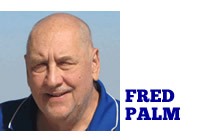
By Fred Palm, special to Statehouse Report
Honorable members of the General Assembly:
 Hope for South Carolina comes in many forms. The latest is that our senators seek safety by wearing masks and evidently, by agreement, have achieved a small win in preventing the spread of COVID-19 among members of this esteemed legislative body.
Hope for South Carolina comes in many forms. The latest is that our senators seek safety by wearing masks and evidently, by agreement, have achieved a small win in preventing the spread of COVID-19 among members of this esteemed legislative body.
Legislative leaders say it is IMPERATIVE that legislators meet in person. Your work is important to you and my family. It is IMPERATIVE for your constituents to attend school and show up at work. My work is important to our state and my family.
There is lingering concern of possible death among many lawmakers in the House and in the Senate — where there are fewer members, but the majority of them are older.
Got that right. If you catch COVID-19, you are more likely to die, especially if you are over 50. It’s a stage of life where most of the senior level leaders of governance, business, industry, education and nonprofits are found. That is part of the science we are following: All age groups matter to COVID-19. Some more than others.
Taking care of self is important. But please do not stop there. What about the rest of us who live here who cannot corral agreements going into retail establishments?
We need soft regulation, strong guidance and communication programs to shift to much higher participation in donning masks.
“The protocols require the participation and cooperation of everyone.” said S.C. Sen. Harvey Peeler, R-Cherokee.
Got that right. The rest of your constituents endure the risk of South Carolina’s “MASKS ARE NOT REQUIRED” stance. We cannot get agreements with thousands to stay safe. Only you can prevent the COVID-19 spread.
Gov. Henry McMaster says mask ordinances are unenforceable. He makes masking an enforcement issue. No more need be said. End of discussion. Nope. Nada.
But should it be? The burden of leadership requires mastery of the facts on the ground and communicating the what and why of the needed responses. It is hard work. This governor, who now has the disease, apparently does not do pandemics.
Effective leaders communicate. Effective leaders would approach the need to mask, especially in communities such as Greenville or Columbia or Myrtle Beach that are on fire, as a communication problem. Effective leaders would engage and not withdraw to the infrequent black-shirted executive press conferences sponsored by McMaster.
Leadership requires both persuasion and engagement. Virus containment is of much longer duration than the 10-day hurricane model.
Rooms are boxes to share viruses. Bars, classrooms, workplaces, legislative chambers are rooms. To the coronavirus, they are all the same.
Why is it that you are so busy protecting your own backside in the enclosed rooms you occupy? Protect the people of our state who are at as much risk in their public rooms as you are in yours but cannot strike “agreements” with passersby. Why do you not unequivocally insist on seeing to it that the people of our state are as protected as you going through your contortions for yourselves?
During the shutdown earlier this year, most of us were “essential.” No doubt the same policy of essentials will be resurrected for vaccine distribution as we go forward. Quite a few of us will be more equal than others.
The vaccine show will not serve the most economic and health affected. Underserved communities of S.C. need equity in our public policy. That requires explicit policy standards written by the legislature when you get back from your bunker.
While you are in session, how about one for masking? Shut off the local brouhahas over masking. Settle the question. This is a health question and not an ideological test that is now being acted out in education and county elected bodies.
You want to survive. So do we. Please send real effective help this way.
Merry Christmas.
Fred Palm of Edisto Island is a retired professor of oversight and investigations at the John Jay College School of Public Management and a former executive director of the Association of Inspectors General.


